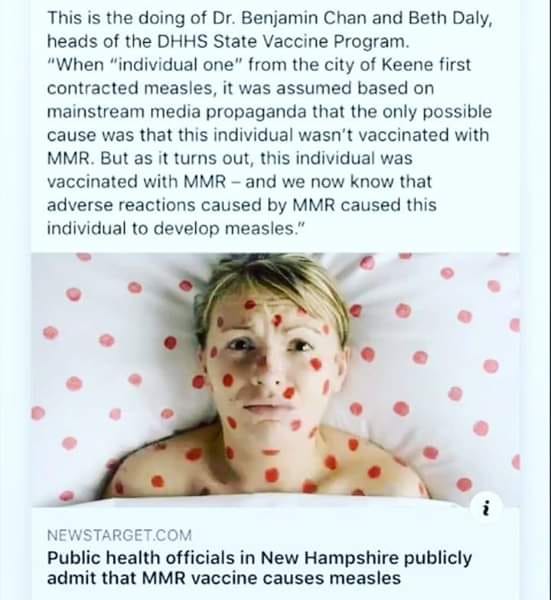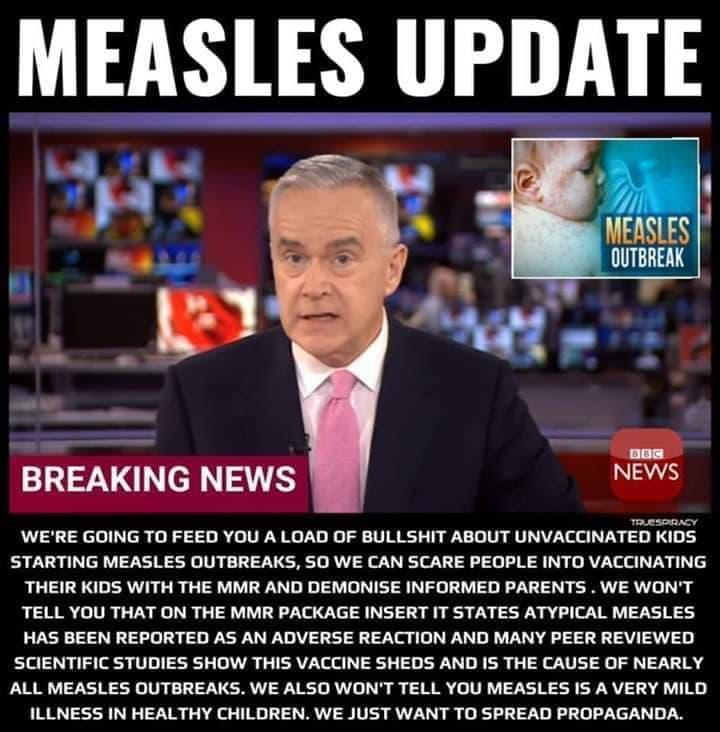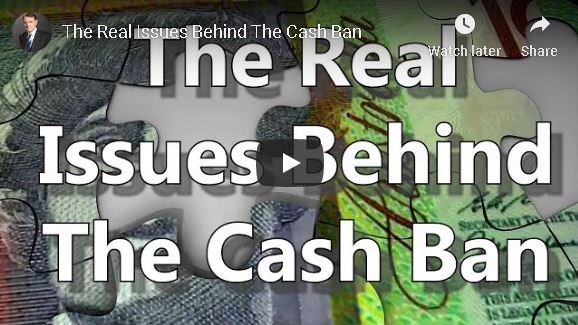MMR Causes Measles

BBC News Measles Update

Caught Red-Handed Scamming and Faking “Science”
“Ho ho ho. Come quietly, it’s a fair cop!” (Translation from the English: Ha ha! We’ve caught you red-handed in a criminal act. Best come along quietly to the police station. Don’t make a fuss”!)
Usually it takes years, or even decades, before the lies and abuses of Big Pharma show up. Meanwhile, the drug company has made a killing in sales and doesn’t care. Sometimes there’s even a fine of a few million dollars, even a few hundred million, as with Merck and Vioxx. But when sales are in the $billions, why should they care?
This time though, the fraudsters must have been shocked to be discovered in the very act, by an international consortium. They probably thought they had years to exploit the scam. So what’s going on?
A group of scientists from leading institutions is questioning the findings of a prominent immunology article linked to a strategic drug development partnership potentially worth up to $183 million (164 million euros). Follow the money, eh?
The original article, published in the journal Cell in 2016, describes studies of the immune systems of patients with rare autoimmune (APS-1). The disease results from mutations in the autoimmune regulator (AIRE) gene that in healthy people plays a role in training immune cells not to attack the body’s own tissue.
Even if you don’t quite understand the gobbledegook, understand this: it could open a doorway to widespread treatment of autoimmune diseases and, since autoimmune diseases are now so common, this means LOTSA MONEY for Big Pharma.
Never wanting to earn an honest $billion, when a crooked $10 million is out there, Big Pharma, of course, plumps for crime, every time!This is how it unfolds…
In an article published in the journal eLife last month, scientists from institutions that include the Karolinska Institute in Sweden, the University of California SF, Stanford University, and the National Institute of Allergy and Infectious Diseases report that they attempted to replicate some of the results from the 2016 Cell article and were unable to do so.
Now I have said many times in my reports that the Karolinska Institute in Sweden is above reproach. I don’t mean they never make mistakes. But they don’t LIE prodigiously like American centers of science. So I trust the Karolinska.imageThe Karolinska Institute. Stockholm, Sweden.
Therefore, when they, and the other three study centers, say they “can’t replicate” the published findings, it almost certainly means something bogus is going in. YES, MEDICAL JOURNALS DO PUBLISH COMPLETELY FALSE PAPERS (OFTEN), SOMETIMES EVEN WITH INVENTED “RESEARCHERS”!
Big Pharma’s dirty fingers are in there, always, to the point where published science has almost meaningless credibility; you can choose to believe it or not believe is, as you like. But if you openly criticize a study, they will probably arrange for you to quietly “disappear” [No, not the concrete shoes! But your article will be quietly withdrawn]
Now they have a problem; 3 world-class research centers say “It looks like you’re lying”! (only they put it politely and say “We can’t replicate your findings.”) That’s going to be hard to bury.
They challenge two of the original article’s findings: that patients with APS-1 produced a much wider range of antibodies against their own bodies’ tissues than previously described. Secondly, that the antibodies “discovered” seemed to protect against diabetes. Again, this is a HUGE market. Diabetes and pre-diabetes are on the rise to the point where over 50% of the US population has one or the other. And as I reported recently, an incredible 88% of Americans did not have full healthy markers for glucose metabolism.
Anyway, these possibly-illusory antibodies became the focus of a development partnership between the France-headquartered pharmaceutical company Servier and German biotechnology company ImmunoQure, said ImmunoQure cofounder Adrian Hayday, PhD, a professor and researcher at King’s College London and corresponding author of the Cell article.
Servier agreed to pay ImmunoQure up to €164 million ($183 million), which includes an upfront payment of an undisclosed amount and additional payments at milestones in the development process, plus royalties on net sales if the antibody makes it to market. Sounds like a bribe to me! Who wouldn’t be careless with the results, when there is nearly $200 million on the table, plus pickings.
Despite the new challenge, a Servier spokesperson said the company’s internal data confirm the importance of the supposed antibody pathway in autoimmune diseases, as well as the specificity and neutralizing activity of the antibody cloned by ImmunoQure. Well, they would say that, of course.Challenging a “Landmark” Article
On the point about the number of antibodies against their own body’s molecules that APS-1 patients are supposed to have developed, the challenging scientists make the case that the statistical analysis in the Cell article was skewed to identify significantly more antibodies in the serum of case patients than of control patients.
“We could show that using random data [meaningless figures], we got basically the same result they did,” said lead author Nils Landegren, MD, PhD, of the Karolinska Institute in Stockholm, Sweden. “We have a very strong case their results are false.” (my addition in brackets).
Landegren and colleagues also ran experiments to test whether the prevention of diabetes theory held water. It did not.image
“We did our best using an established method, using positive and negative controls showing the expected result,” Landegren said, but they could not see any difference between patients who had type 1 diabetes and those who did not. It will be important for other research groups to try to replicate the experiment in future studies and to see how they fare, Landegren said.
That’s good science.
Hayday said his group used the statistical analysis method they did because he was more concerned about ruling out false negative results than false positives when looking for antibodies expressed as “private reactivities” in a few patients, not the cohort as a collective group. That’s BAD science…
Translation: bend the result in favor of the findings we want, rather than allowing “false” negatives to screw it up. But to me, that’s as good as a confession of malfeasance. Since he’s not supposed to know before he starts what the results will be, why would he be skewing the results away from a negative finding?
Hayday sees the difference in statistics as a difference in approach: “When you undertake a statistical treatment of data, there is no silver bullet, you have to use what makes sense.”
In the end, it got dirty. Hayday accused the other teams of “shoddy” work! Sounds like someone caught red-handed, doesn’t it? When four other study centers, who have no academic or financial bias factors, say his results aren’t valid, who would you side with?
Now others have stepped in. London-based pharmaceutical company AstraZeneca and the small French biotech Neovacs, both studies failed their primary endpoints. These recent clinical data are “mixed at best”, they said.
Access to ImmunoQure’s website currently requires login credentials, but Hayday said that that is unrelated to the recent publication. Oh yeah! The website is being redesigned and will be back up again in about 10 days, he said.
Is this starting to stink a little bit, to you?
One of the scientists who reviewed Hayday’s work from 2016 rejected the Karolinska team’s criticism and spoke of a “landmark” paper. Another scientist reviewer disagreed: “This appears to warrant a revision to the original conclusions in Cell…”
As for the contested statistical analysis, one reviewer wrote that Landegren’s and colleagues’ concern is “100% warranted.”
Incidentally, the authors of the new critique originally submitted their manuscript to Cell, but it was rejected without an explanation, Landegren said.
And that’s just about where the “science” ends, folks. Quibbling, disagreement, almost certain malfeasance, if not fraud, and name calling.
I’m glad I’m out of it. I treated autoimmune diseases with far higher positive outcomes for decades, talking with Mother Nature, prescribing better diet, chemical unburdening, parasites, dysbiosis and sometimes a little psychological “lift”!
Food allergies and environmental chemical sensitivity were by far the most common mediators of autoimmune disease.
I thought I’d just give you a heads up on how they do “science” these days,image
Prof. Keith Scott-Mumby
The Official Alternative Doctor
Conflict of interest: Landegren has disclosed no relevant financial relationships. Hayday, not surprisingly, reports holding equity in ImmunoQure, as do other coauthors of the formal response!
Sources:
1. eLife. Published online June 27, 2019.
Energy drinks and junk food are destroying teenage brain development

Given how accessible cheap, energy-rich, nutrient-poor junk foods are to teenagers—teens consume the highest amounts of these foods of any age group—a lifetime of poor behavioral choices follow when no interventions are made. The stunning rise of obesity in not only adults but children and teens as well is cause for alarm. The prevalence of obesity in American children is now at 31 percent.
The changes in reward circuitry prompted by junk food result in poor cognitive and emotional performance. The teen (and future adult) suffers from increased impulsive behavior and impairments in memory consolidation and social interactions. Males in particular experience impaired behavior inhibition after consuming large volumes of sugar sweetened beverages. The hippocampus suffers in high-sugar diets, which is also known to induce cognitive deficits over time.
I Before E

Just in case you were considering a part time job as an English tutor…
Tough Gig For Whistleblowers
“After close to 10 years trying to live under the oppressive shadow of the criminal justice system in this country,” Jeffrey Sterling told us a few days ago, “I am still adjusting to this new life of mine, a life not under the gaze or thumb of the CIA and the Department of Justice.”
Jeffrey’s “new life” is a far cry from his years in prison that followed what BBC News called a “trial by metadata.” The government’s anti-whistleblower crusade has tried to crush Jeffrey. That effort has been unsuccessful, in part due to assistance that he has received from RootsAction Education Fund supporters.
The Education Fund was proud to work in solidarity with Jeffrey during his long imprisonment, and we’re now equally proud to sponsor his work as the coordinator of The Project for Accountability. You’ll give him a lift if you make a tax-deductible donation in support of that exciting new venture. https://salsa.wiredforchange.com/o/6503/p/salsa/donation/common/public/?donate_page_KEY=12044
After Jeffrey readily acknowledged going through channels to blow the whistle on an ill-conceived and dangerous CIA operation against Iran involving flawed diagrams for nuclear weaponry, the U.S. government prosecuted him on charges that he provided classified information to a New York Times reporter who included it in a book.
The January 2015 trial had a jury that included no African Americans and was filled with people sympathetic to local Northern Virginia mega-employers like the Pentagon and CIA.
Now, as Jeffrey explains below, his life is starting to turn around. He just became extricated from probation. And his long-awaited book Unwanted Spy will be published this fall.
You can help The Project for Accountability if you click here and make a tax-deductible contribution. Half of every dollar you donate will go directly to Jeffrey as he works to rebuild his life, while the other half will go to sustaining his project.
To learn more about Jeffrey’s real-life nightmare of harassment, legal threats and persecution, please take a look at the Background information we link to at the bottom of this email.
We asked Jeffrey to share with you some of his current thoughts, and he responded quickly._________________________
[From Jeffrey:]
I did realize so long ago when I decided to say “no” to being discriminated against at the CIA that the road would be a difficult one, but I could not, or more accurately did not want to imagine that the journey would include arrest, conviction, and imprisonment. That part of the journey ended last month when the court granted, despite objection by the Department of Justice, my request to terminate the pointless supervised release I was shackled with. After such a long time, I am not sure if I know or remember what freedom is or at least what it is supposed to feel like. One thing is for certain, I am grateful for having survived the ordeal. Now, there is the matter of how to reconcile what I have experienced with loving my country.
I don’t know if I can ever forget the pain that I have experienced at the hands of the CIA who discriminated against me because of the color of my skin, or the Department of Justice and the criminal justice system that wrongfully prosecuted and imprisoned me for an alleged crime I did not commit, but I am confident that I will and can journey beyond it. Part of that journey has to include feeling a part of the country that I love. Recently, while still trying to get used to the idea of no longer being under the thumb of the probation office, I received something in the mail which affirmed that my return can happen.
It was a manila envelope with the return address of the local probation office that I fell under for the past year. I certainly wasn’t expecting any additional contact with my former overseers, so I was nervously curious about what the letter contained. To my ultimate surprise, it was a certificate of completion, commemorating a successful end to supervised release. What an insult! I wondered if I was expected to frame the certificate as a memento of the ordeal and benevolence of the criminal justice system.
As I began to toss the certificate into the recycle bin, I noticed that there was another sheet of paper along with the certificate. It was a notification of reinstatement of voting rights once a convicted felon has completed his sentence as well as parole, or probation. I cannot overstate how important the restoration of one civil right means to me. The persecution I endured meant more to me than just being convicted and being sent to prison, it meant I was essentially stripped of being a citizen of the country I believed in and fought so hard to be a part of. Now, I have at least one hallmark of citizenship returned to me, I could once again vote.
I have often wondered whether I would partake in any more civic duties as a convicted felon, I had difficulty finding the worth in doing so. Previous to the horrible ordeal, I was an emphatic voter. I not only felt voting a right but also a responsibility that I thankfully had because of the struggle against wrongs that so many sacrificed so much for me to be able to enjoy. But, given my experience, I didn’t know if I could find it within myself to vote again.
Then, I reminded myself of the words of Nelson Mandela who was describing the day he was released from prison, “As I walked out the door toward the gate that would lead to my freedom, I knew if I didn’t leave my bitterness and hatred behind, I’d still be in prison.”
I realized that if I choose to not take advantage of having a cherished civil right returned to me, then I would still be a prisoner of the unjust system that persecuted me. Yes, I have some bitterness and anger over what has happened, but if I hold on to those feelings then that means giving up on not only my country but myself.
I eagerly await the next election and I don’t care if it is for dogcatcher or coroner, I will gladly cast my ballot. If I am going to return to this country, then it is my duty to take advantage of the rights I have, especially those that have been restored. And, isn’t such a thing what accountability is all about? Ultimately, the vote is the most powerful tool of accountability that we as citizens have. I imagine that the coming elections will be watershed moments holding government accountable and that I will be joined by many others who want and expect meaningful change.
I hope to meet many of my fellow citizens during the forthcoming fall tour for my book Unwanted Spy._________________________
Jeffrey’s refusal to knuckle under to illegitimate power has come at a very steep personal cost. That’s the way top CIA officials wanted it. His enduring capacity to speak truthfully can help strengthen a wide range of whistleblowers — past, present and future.
You can help make that happen with a tax-deductible donation of any amount.
Please do what you can to support Jeffrey’s work as coordinator of The Project for Accountability. https://salsa.wiredforchange.com/o/6503/p/salsa/donation/common/public/?donate_page_KEY=12044
Thank you!
— The RootsAction Education Fund team
Take Us To Your Leader

With our present PM I am thinking this is not a bad idea!
Should You Eat Organic Foods to Reduce Your Cancer Risk? A New Study Says Yes

A 2018 paper published in JAMA Internal Medicine by a team of French scientists reports a 25% decrease in overall cancer risk from relatively high levels of organic food consumption, compared to little or no organic food consumption, in a large, prospective, epidemiological study.
The Real Issues Behind The Cash Ban

The unethical and criminal banking cartel should not have a monopoly on how we transact. It is also a security point. Without cash we do not have a backstop if digital processing fails. Imagine not being able to buy groceries or top up your tank because the system was down. No fun at all!
